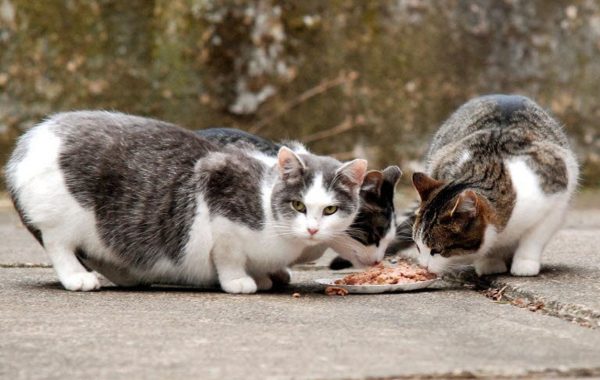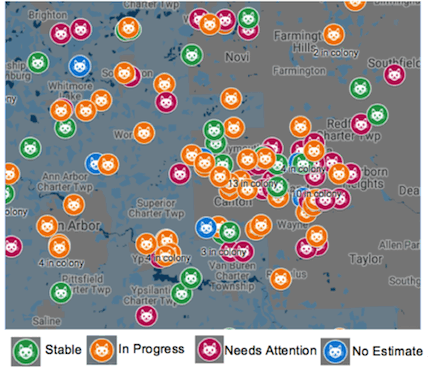Community cats are free-roaming cats who live outdoors and may have humans helping take care of them, but are not “pets.” With proper community support and proper care—including the need to be fixed and vaccinated—people and community cats can share the earth harmoniously.
TNR Scheduling
TNR is currently BY APPOINTMENT ONLY. Openings are on Thursdays and Fridays. Please direct all inquiries to the Community Cat Coordinator at (734) 661-3523 or TNR@hshv.org.
During Spring/Summer months, appointments go quickly due to peak kitten season! Please be advised that we may need to schedule a month or two into the future.
In the Winter months (i.e., very cold weather), TNR will be limited to injured or possibly pregnant feral cats. As the caretaker, you would need to house the cat in a safe and warm environment during the recovery period.
This document contains information about Michigan clinics who may be offering TNR services in Winter.
PLEASE BE ADVISED: The TNR program is exclusively for unsocialized cats who cannot be handled. If you have an outdoor cat who can be safely handled, please reach out to our clinic.
TNR Appointment Preparation Tips
- If you are trapping and bringing the feral cat(s) yourself, each cat must be in an individual, size-appropriate live trap (not a squirrel trap, crate, or cat carrier).
- Cats brought in inappropriate containers may be subject to a $50 trap transfer fee.
- If we are coming to your property to set traps, please pull any food a day in advance. Water is okay to leave out. Trap setting will occur the day before your scheduled appointment (e.g., a Friday appointment will result in a Thursday trap setting day).
- Traps and any captured cats will be retrieved on the morning of the appointment. Any cats who have been identified as a previous TNR participant will be released upon contact – we will not be transporting them back to the shelter for TNR services.
- Cats undergoing surgery will be released back to the original property on the day after their procedures (e.g., a Friday appointment will see cats released on Saturday).
- If you are located outside of Washtenaw County, we are currently unable to offer on-site trapping services. You are still welcome to schedule an appointment if you can trap and transport on your own.
Pricing
In County Fees:
- $40 per cat for spay/neuter, FVRCP (feline herpes and distemper) vaccine, rabies vaccine, and ear tip indicator
- $60 per cat for spay/neuter, rabies vaccine, FVRCP (feline herpes and distemper) vaccine, flea & tick preventative, and ear tip indicator
Out of County Fees:
- $90 per cat for spay/neuter, FVRCP (feline herpes and distemper) vaccine, rabies vaccine, and ear tip indicator
- $110 per cat for spay/neuter, rabies vaccine, FVRCP (feline herpes and distemper) vaccine, flea & tick preventative, and ear tip indicator
Additional Rental/Treatment Fees:
- $75 for trap rental ($65 is refunded once trap is returned)
- $60 for basic wound repair (clean wound site, antibiotic injection)
- $210 for basic injury treatment (x-rays, tail removal, eye removal, pain medication)
- $310 for serious injury treatment (x-rays, limb removal, sutures, pain medication)
We are not currently offering revaccination for TNR cats.
More Information
If you feed or would like to report community cats in our service area, please fill out a TNR colony monitoring form
What to do if you see kittens – HSHV kitten guide
Have questions? Check out our FAQ’s
List of MI clinics that offer TNR S/N surgery – MI TNR Resource List
List of MI clinics that offer full cost services for unsocial cats – MI Unsocial Cat Veterinary Resource List
See below for videos on how to TNR.
TNR Video Resources
Ways to Help
Sewing Trap Covers – Cat Trap Cover Sewing Pattern TNR
TNR wishlist – https://www.amazon.com/hz/wishlist/ls/IUZV63DY4IVX?ref_=list_d_wl_lfu_nav_5
Support our TNR program via our Amazon Wishlist
Volunteers can find resource information on the Volunteer Resources page.
* Includes all TNR activity through July 2021

Blog
What To Do With Community Cats When Moving?
Interview with Feral Kitty Trappers President – Karen Frazer

Mapping
Please report any colonies you are aware of, to help HSHV monitor cat colonies to help us better understand and care for our county’s community cats. None of your personal information will be shared and we do not publish specific addresses.




